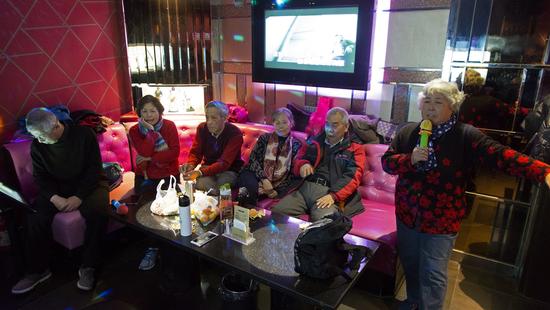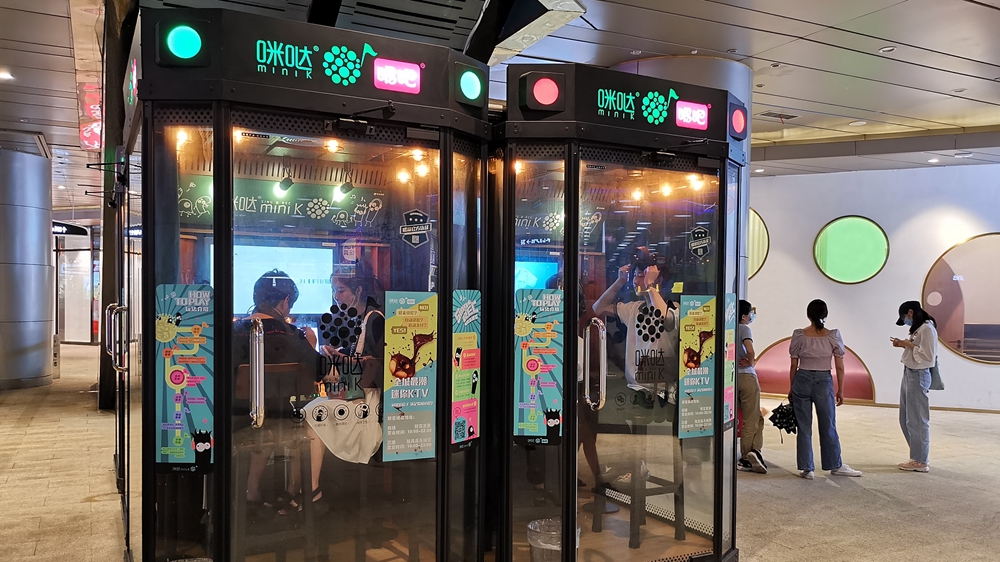
People walk past a KTV in Beijing, July 22, 2020. /CFP
People walk past a KTV in Beijing, July 22, 2020. /CFP
Once a popular choice of entertainment for the nation's youth, KTV bars are now wooing elderly people and facing mini KTVs challenges.
No more attractions for youth
"The first time I went to KTV was the summer holiday when I completed the entrance examination to high school," 31-year-old Chen Ye told Workers' Daily, adding that "at that time, I often gathered with my friends in KTV, sometimes two to three times a week."
"Maybe there are more and more entertainment choices nowadays so that KTV is not that attractive for me," said Chen, adding that he could not remember the last time he went to KTV.
Li Jingwen, who was born after 1995, also had this feeling. During the past Spring Festival holiday, Li suggested singing in KTV with her friends on the social messaging app WeChat. Still, her friends ignored her suggestion, who said they had not gone to KTV for a long time and advised her to change for another entertainment.
Participants in the business obviously felt pressure to maintain the operations. "Between 2005 and 2009, rooms in our KTV often needed to be booked two days ago, and all the rooms were occupied even on workdays. However, the scene changed after the year 2015, when many outlets gradually closed," Chen Jun, a former sales manager for an outlet of Partyworld KTV, a popular KTV venue in Beijing, told Workers' Daily.
Chen added, nowadays the KTV venue only has one outlet opened in Beijing.
Analysis from business insiders showed that people born in the 1980s and 1990s used to be the main consuming force of KTV, but now most of them are occupied with families and careers, which eroded their inspiration for singing, let alone there are many other entertainment choices, including online games and social apps.

The elderly sing at a KTV room in Beijing, November 2017. /Xinhua
The elderly sing at a KTV room in Beijing, November 2017. /Xinhua
Gray-haired crowd
In comparison with the youth, KTV bars are becoming a favored hangout for the country's elderly.
"We can enjoy singing a whole afternoon by spending more than 100 yuan ($15)," Zhang Baogang, 63, told Workers' Daily, adding that "besides singing, we can also chat with each other."
An elderly woman surnamed Jiang said that we don't care how beautiful we can sing, it's important for us to interact with friends and strengthen our friendship by singing in KTV.
An operation manager surnamed Zhao said though KTV lost its charm to young people, it's attractive for elderly people, and some of them also love singing.
Zhao also said that many elderly people do not have nightlife, and their entertainment activities mainly concentrate in the daytime, that's why KTV booths are occupied by the elderly during the daytime.
In response to the gray-haired crowd's demands, some KTVs also launched discounts and added some old songs to attract the group.
Challenges ahead
The year 2020 is the most difficult year for many KTVs. Due to the COVID-19 pandemic, all the KTVs in Beijing suspended their operations for nearly half a year and gradually resumed operations from July, causing some of them to go bankrupt.
Facing the ongoing pandemic, it's still uncertain how long the remaining KTVs could survive.
Besides, there are also challenges from mini KTVs and Online karaoke platforms at present.
Mini KTVs, located in a sound-proofed private space of less than two square meters, are scattered at shopping centers and movie theaters in many cities nowadays.

Mini KTVs at a shopping mall in Wuhan City, central China's Hubei Province, July 29, 2020. /CFP
Mini KTVs at a shopping mall in Wuhan City, central China's Hubei Province, July 29, 2020. /CFP
Everything can be done by scanning a QR code with a mobile phone, from logging on to making payments. Singers can also record their performances and forward them to friends.
"Though my friend and I rarely went to sing songs in KTVs, we often have dinners in a shopping mall and enjoy singing at a mini KTV after shopping," said Li Jingwen, adding the mini KTVs meet the demands of people whose time is fragmented.
Meanwhile, the mobile internet has transformed the KTV industry, as many young people rely on sing-along apps, which enable them to enjoy singing anytime and anywhere.

